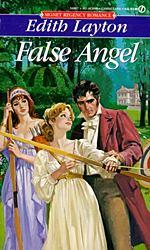Edith Layton/Incidental Shakespeare

In Edith Layton's False Angel, the anti-heroine loses
the man she is angling for because she cannot read the manuscript of
Blake's Book of Moonlight, but the hero, rescued from her clutches,
discovers that the insights and opinions on Shakespeare which she has
been quoting, actually originate with the heroine. In turn he
comforts her for her unfashionable dark beauty not with the
predictable sonnet, of which she says "It's a nice bit of verse,
but although it's the opposite of what he intended, I've always
considered it lowering to the dark lady's spirits," but with a
quotation from her favorite character, Mercutio, "He's already
dead: with a white wench's black eye" (219). In these cases,
Shakespeare's texts help to establish both an individual hero or
heroine's depth of character, but also his or her suitability as the
match to a comparably literate mate.
Layton herself notes that the Shakespearean references may
elude her readers but are satisfying for her:
I confess, I like to put Shakespeare in many of my books, not
just in hopes that association will give me some polish but
because the references please me. I'll admit I didn't consciously do
it in Leonora's case. But I did, in the "Love Trilogy"
("extended Regencies" as my then editor dubbed them). The
theme ran through all three books. I thought it would be especially
noticeable in the second one: "Game of Love", given the
quote on the first page, and the main character, "Lion",
aka Arden. But alas! No one ever wrote to tell me they noticed that.
So, I suppose, when I try no one sees it, but when it's just rumbling
around in my subconscious - you did (12 Oct 1997 09:35:25).
The romance author's involvement in Shakespeare need not be so
obvious that it functions as a central part of the narrative--as with
some of the actress novels. Instead such references can be meaningful
as incidental Shakespeare, a kind of cultural shorthand which either
invokes particular features in his works or perhaps even revises
those features. 
Indeed, Layton's The Game of Love does use Shakespeare
more extensively and more obviously than the other two books in the
series. The hero, Arden Lyons, not only embodies the opening epigram
from A Midsummer Night's Dream that "a lion among ladies is a
most dreadful thing" (5) in his fears about his size and
roughness, he also is inspired to liken his lady to the pearl in the
Ethiope's ear from Romeo and Juliet and challenge an army deserter
with Falstaff's words from 1 Henry IV. The latter is particularly
provocative since the deserter from Wellington's army offers
enthusiastic agreement with Falstaff's debunking of honor, only for
Lyons to reveal the context and insist that Shakespeare was
undermining Falstaff's position.
Go to Introduction References
by Play Return to Shakespeare Quoters




